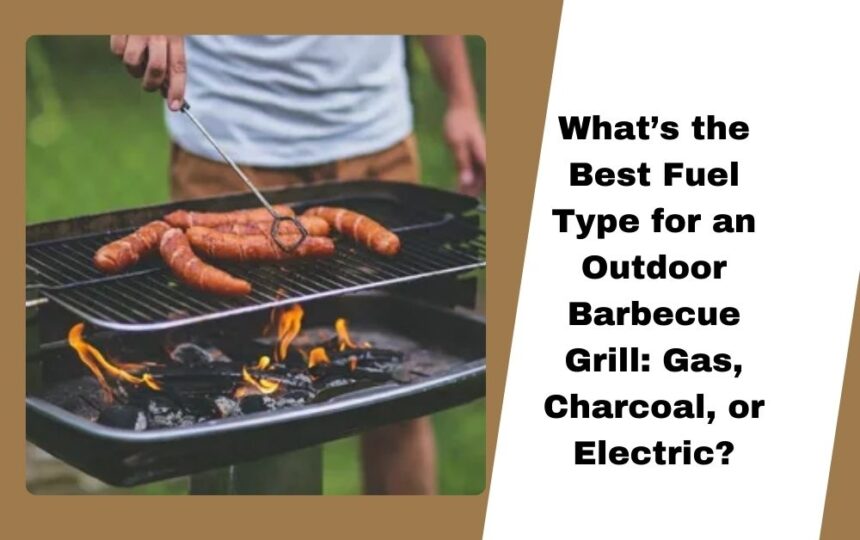When it comes to outdoor cooking, the barbecue grill is a centerpiece for many gatherings. Whether you’re a seasoned griller or a beginner, choosing the right fuel type for your barbecue grill can make a significant difference in your cooking experience. The three main types of grill fuels are gas, charcoal, and electric. Each has its own set of advantages and drawbacks. In this blog, we’ll explore these fuel types in detail to help you decide which one is best for your outdoor grilling needs.
Understanding the Basics of Grill Fuels
Before diving into the specifics, it’s essential to understand what each fuel type entails and how it affects your grilling experience.
Gas Grills
Gas grills are powered by propane or natural gas. They are popular for their convenience and ease of use. Most gas grills come with burners that can be easily adjusted to control the heat.
Charcoal Grills
Charcoal grills use charcoal briquettes or lump charcoal as their fuel source. They are known for imparting a smoky flavor to the food, which many barbecue enthusiasts love.
Note: Experience the ultimate outdoor cooking with a versatile Outdoor Barbecue Grill. Perfect for any season, these grills allow you to enjoy delicious grilled meals while enjoying the fresh air. From compact models for small spaces to large grills for entertaining, there’s an option for everyone. High-quality Outdoor Barbecue Grill units are built to last, offering consistent performance and easy maintenance. Ready to upgrade your outdoor cooking setup? Visit Hazel Gazebo and browse their extensive range of grills to find the one that fits your lifestyle perfectly.
Electric Grills
Electric grills use electricity to generate heat. They are often used in places where open flames are restricted, such as apartments or condos.
Advantages of Gas Grills
Gas grills are a favorite among many grillers for several reasons. Let’s explore the benefits they offer.
Quick and Easy to Use
One of the biggest advantages of gas grills is how quickly they heat up. With the turn of a knob, you can have your grill ready in minutes. This is perfect for those times when you want to grill without waiting.
Temperature Control
Gas grills offer precise temperature control. You can easily adjust the heat by turning the burners up or down. This makes it easier to cook different types of food that require various cooking temperatures.
Convenience
Gas grills are generally more convenient for everyday use. They require less cleanup compared to charcoal grills, as there’s no ash to dispose of. Additionally, many gas grills come with features like side burners and rotisserie attachments.
Consistent Heat
Gas grills provide consistent heat, which is essential for even cooking. This consistency helps in achieving perfectly cooked meals every time.
Disadvantages of Gas Grills
While gas grills have many advantages, they also come with some drawbacks.
Initial Cost
Gas grills tend to be more expensive upfront compared to charcoal grills. The initial investment can be a barrier for some people.
Flavor
While gas grills are convenient, they may not provide the same smoky flavor that charcoal grills do. Some grillers feel that gas grills lack the authentic barbecue taste.
Dependence on Fuel Source
Gas grills rely on propane tanks or a natural gas connection. Running out of fuel in the middle of a cookout can be inconvenient, especially if you don’t have a backup source.
Advantages of Charcoal Grills
Charcoal grills are beloved for their unique ability to infuse food with a rich, smoky flavor. Here are some of their key benefits.
Superior Flavor
Charcoal grills are known for the distinct smoky flavor they impart to food. The combustion of charcoal releases aromatic compounds that enhance the taste of grilled items.
High Heat
Charcoal grills can reach higher temperatures than gas grills, making them ideal for searing meats and achieving that perfect char.
Affordability
Charcoal grills are generally more affordable upfront. They are a great option for those who want a quality grill without breaking the bank.
Versatility
Charcoal grills offer more versatility in cooking styles. You can use different types of charcoal and add wood chips to create various flavor profiles.
Disadvantages of Charcoal Grills
Despite their advantages, charcoal grills also have some downsides.
Longer Heating Time
Charcoal grills take longer to heat up compared to gas grills. It can take up to 30 minutes to an hour to get them ready for cooking.
More Cleanup
Using a charcoal grill involves more cleanup. You need to dispose of the ashes and clean the grill grates after each use, which can be time-consuming.
Temperature Control
Controlling the temperature on a charcoal grill can be challenging. It requires more attention and skill to maintain the desired heat level.
Less Convenient
Charcoal grills are less convenient for everyday use. They are better suited for occasional grilling sessions rather than frequent use.
Advantages of Electric Grills
Electric grills offer a unique set of benefits, especially for those who need a portable or indoor grilling option.
Easy to Use
Electric grills are straightforward to use. Simply plug them in, set the temperature, and start cooking. There’s no need to manage flames or charcoal.
Clean and Safe
Electric grills produce minimal smoke and no open flames, making them safer and cleaner to use. They are an excellent choice for apartments or areas with fire restrictions.
Quick Heating
Electric grills heat up quickly, similar to gas grills. This makes them convenient for fast cooking sessions.
Compact and Portable
Many electric grills are compact and lightweight, making them easy to transport and store. They are ideal for small spaces and on-the-go grilling.
Disadvantages of Electric Grills
While electric grills have their benefits, they also come with certain limitations.
Limited Flavor
Electric grills do not provide the same smoky flavor that charcoal grills do. The taste of the food may be less intense compared to other fuel types.
Power Source Required
Electric grills need a power outlet to operate, which can limit their placement options. They are not suitable for outdoor areas without easy access to electricity.
Lower Heat Output
Electric grills generally have a lower heat output compared to gas and charcoal grills. This can affect the cooking performance, especially for high-heat recipes.
Less Versatile
Electric grills are less versatile in terms of cooking styles. They are best suited for straightforward grilling rather than more complex cooking techniques.
Comparing the Fuel Types
To make an informed decision, let’s compare gas, charcoal, and electric grills based on various factors.
Cost
- Gas Grills: Higher initial cost, but can be cost-effective in the long run due to reusable propane tanks or a natural gas connection.
- Charcoal Grills: Lower initial cost, but ongoing costs for charcoal can add up over time.
- Electric Grills: Moderate cost, depending on the features and brand.
Flavor
- Gas Grills: Mild flavor, lacking the smoky taste of charcoal.
- Charcoal Grills: Rich, smoky flavor that many barbecue enthusiasts prefer.
- Electric Grills: Minimal smoky flavor, more neutral taste.
Convenience
- Gas Grills: Highly convenient with quick heating and easy temperature control.
- Charcoal Grills: Less convenient due to longer heating times and more cleanup.
- Electric Grills: Very convenient, especially for indoor or restricted areas.
Maintenance
- Gas Grills: Easy to maintain with minimal cleanup required.
- Charcoal Grills: Requires regular cleaning of ashes and grill grates.
- Electric Grills: Easy to clean with removable parts, but dependent on electricity.
Versatility
- Gas Grills: Versatile with various cooking features and accessories.
- Charcoal Grills: Highly versatile for different cooking styles and flavors.
- Electric Grills: Limited versatility, best for straightforward grilling.
Portability
- Gas Grills: Some models are portable, but larger ones can be bulky.
- Charcoal Grills: Generally portable, especially smaller models.
- Electric Grills: Highly portable and easy to move, but require a power source.
Making the Right Choice for You
Choosing the best fuel type for your outdoor barbecue grill depends on your personal preferences, lifestyle, and grilling habits. Here are some questions to consider when making your decision.
How Often Do You Grill?
If you grill frequently, a gas grill might be the best option due to its convenience and ease of use. For occasional grilling, a charcoal or electric grill could suffice.
What Flavor Do You Prefer?
If you love the smoky flavor that only charcoal can provide, a charcoal grill is the way to go. For a more neutral taste, gas or electric grills are suitable.
Where Will You Be Grilling?
Consider where you’ll be using your grill. Electric grills are ideal for indoor use or areas with fire restrictions. Gas and charcoal grills are better suited for outdoor spaces.
What’s Your Budget?
Factor in both the initial cost and the ongoing expenses. Charcoal grills are generally cheaper upfront, but gas and electric grills might offer better long-term value depending on your usage.
Do You Value Convenience?
If convenience is a top priority, gas or electric grills are more user-friendly and require less maintenance compared to charcoal grills.
Tips for Choosing the Right Grill
Once you’ve decided on the fuel type, here are some additional tips to help you choose the right grill.
Size and Capacity
Consider the size of your outdoor space and how much cooking area you need. Grills come in various sizes, so choose one that fits your space and meets your cooking needs.
Features
Look for features that enhance your grilling experience, such as side burners, rotisserie attachments, storage shelves, and temperature gauges.
Build Quality
Invest in a grill made from high-quality materials. Stainless steel grills are durable and resistant to rust, ensuring your grill lasts for years.
Portability
If you plan to move your grill frequently, look for a portable model with wheels and a lightweight design.
Ease of Cleaning
Choose a grill that is easy to clean. Removable parts and grease management systems can make the cleanup process much easier.
Maintenance Tips for Your Grill
Proper maintenance can extend the life of your grill and ensure it performs well every time you use it.
Regular Cleaning
Clean your grill after each use to prevent buildup of grease and food particles. For gas grills, check the burners and ensure they are free from blockages. For charcoal grills, dispose of the ashes and scrub the grill grates.
Cover Your Grill
Use a grill cover to protect it from the elements. This helps prevent rust and damage from weather exposure.
Inspect for Damage
Regularly inspect your grill for any signs of damage or wear and tear. Replace any damaged parts promptly to maintain safety and performance.
Store Properly
Store your grill in a dry place when not in use. This helps prevent rust and keeps your grill in good condition.
Conclusion: Finding the Perfect Grill for Your Needs
Choosing the best fuel type for your outdoor barbecue grill involves weighing the pros and cons of gas, charcoal, and electric grills. Gas grills offer convenience and precise temperature control, making them ideal for frequent grilling. Charcoal grills provide a rich, smoky flavor that many barbecue enthusiasts love, though they require more time and effort. Electric grills are perfect for those who need a clean and safe option, especially in areas with restrictions on open flames.
Ultimately, the best grill for you depends on your personal preferences, cooking style, and lifestyle. By considering factors such as cost, flavor, convenience, and maintenance, you can make an informed decision that will enhance your outdoor cooking experience. Happy grilling!
For More Insightful Articles Related To This Topic, Feel Free To Visit: newsdusk.



